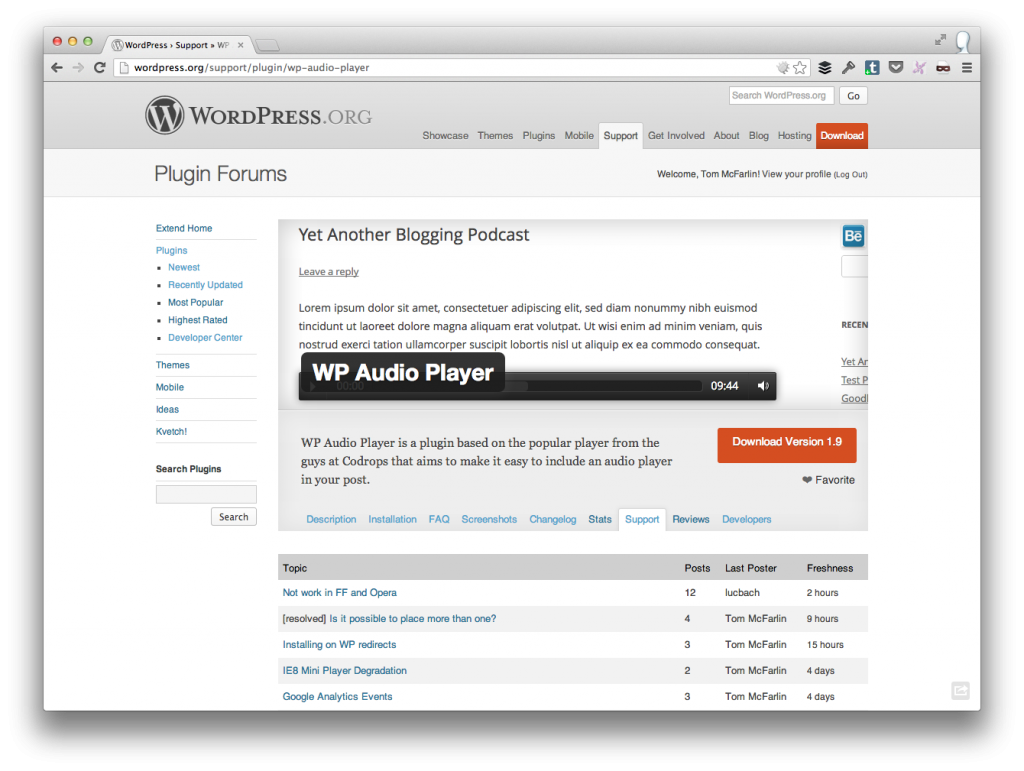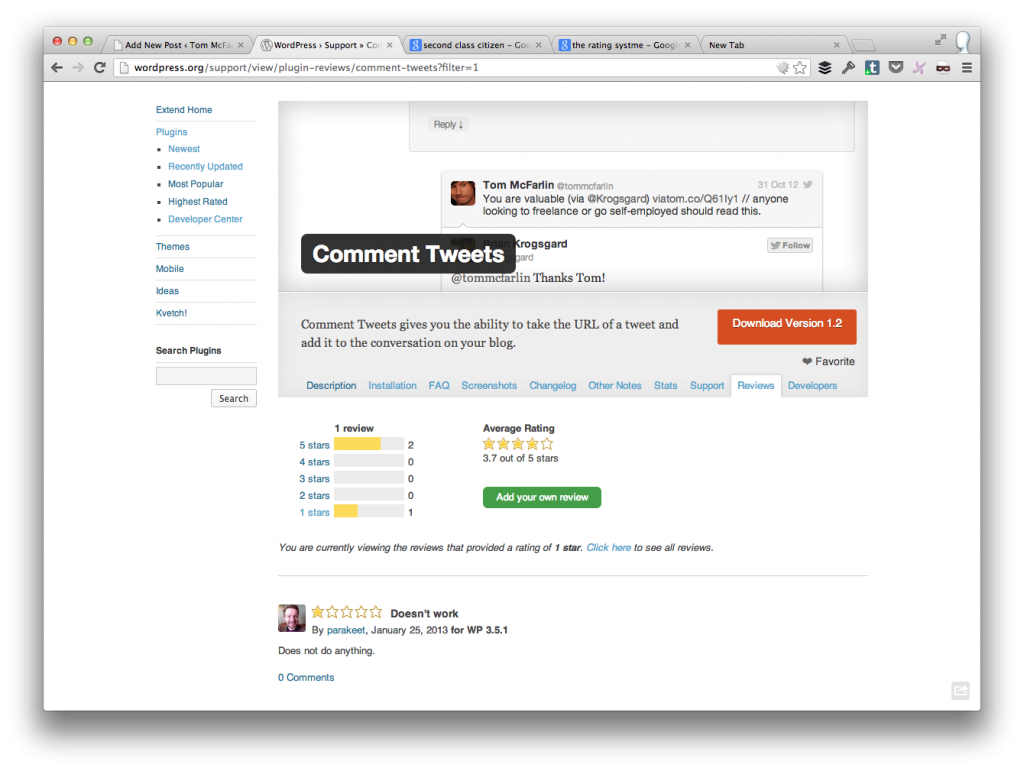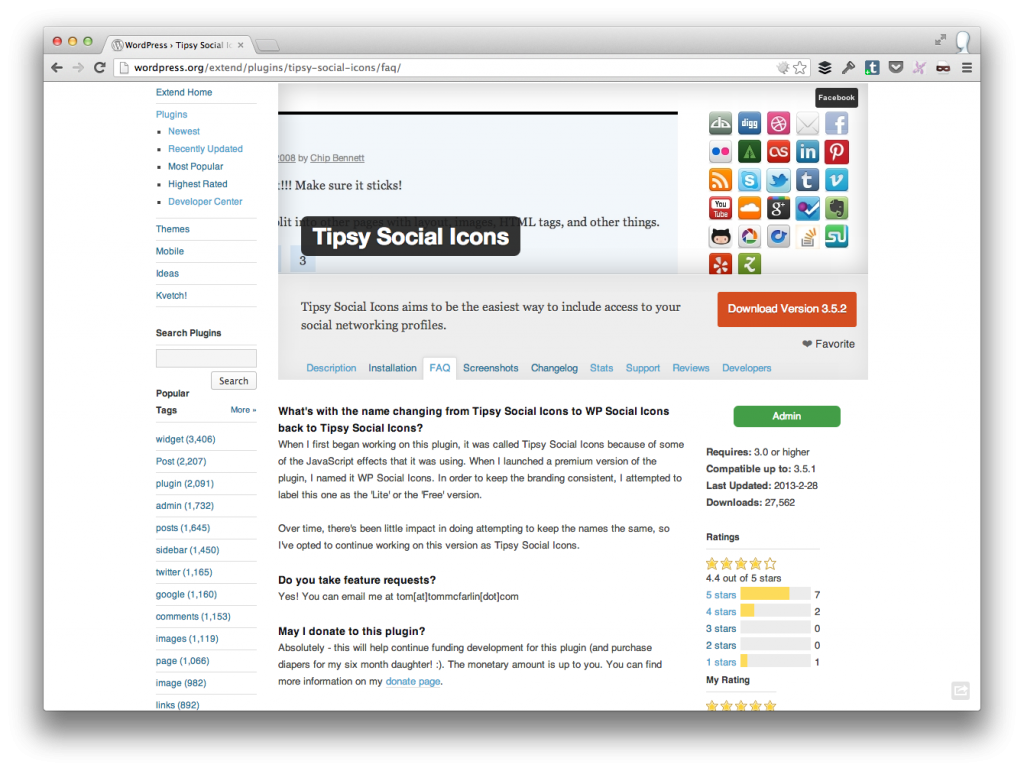I’ll be the first to admit that I think the WordPress Plugin Repository does some great things for WordPress and for its user base. When they rolled out the updated forums and the some of the new features, I was really excited about it.
But as time has passed, I’ve come to believe that the repository is more user-centric than developer-centric. Don’t read me wrong: I’m not claiming that this is an either/or situation. Ideally, both should be elevated to the same level.
On one hand, this makes perfect sense. After all, you have thousands of plugins all of which are available for users to search and download not only from the web, but from within the WordPress dashboard.
But plugins are created by developers – often times for free, obviously – but I don’t think that the repository does such a good job of supporting the work of the developers.
Sure, I agree that free hosting of your plugins is great and the ability to generate a landing page with several rich features based solely on a README is impressive, but each of these things also results in a number of issues that simply make it difficult to stay motivated to continue contributing plugins to the economy.
All that to say, I think the repository is a fantastic resource where users are the first class citizens. To that point, I want to outline several issues that I’ve experienced while using the WordPress plugins repository as a developer.
And for those of you who have read this blog, you know that I dislike when people offer problems without proposed solutions, so I’m aiming to provide those, as well.
1. Support Forums

Out of the box, I actually really like the fact that the WordPress Plugin Repository provides users with the ability to share their support requests with the developer.
Ideally, it should provide a centralized place for users to share their issues, and I also think there should be a place for users to submit feature requests. It should also notify the developer when a new issue has been created.
Unfortunately, it still places the burden of monitoring the support forums on the developer.
Whenever a developer releases a new plugin into the repository, a Support tab is automatically created on the plugin’s homepage. This is where user’s should go in order to dialog with the developer.
The problem is that the support system is basically a pull system and it puts the burden of pulling the new issues on the developer.
This means that every time I release a new plugin, I need to check that plugin’s support forum. If a new issue arises, I can subscribe to that particular issues thread via email, but only after I check the forum first.
Also, Brad reminded me of the RSS link available for each plugin at the bottom of the plugin page. Again, this is absolutely better than nothing at all, but it <em>still</em> creates the problem of a pull system.
As such, I have to have weekly reminders to check the support forum for each of my plugins and subscribe to any new issues.
As soon as the plugin is live, I should automatically receive emails when a user posts an initial issue, and then I should have the opportunity to opt-in to future emails on a per-issue basis (just like it works now).
2. The Rating System

The rating system in the WordPress Plugin Repository is the feature that I take issue with the most. I understand the need for ratings – it’s meant for users to vet the software that they are about to install in their WordPress setup.
But the rating system places too much power into the hands of users without vetting the reasons for the user’s action.
Case in point, I have one plugin that has received a 1-star rating that reads:
Does not do anything.
There’s no support forum request or anything feedback to let me know what issues this person has experienced. That very same plugin has a couple of five star ratings.
That’s a serious gap, isn’t it?
The problem is that user’s can give a plugin a single star if they think that it doesn’t work, if they dislike it, or out of pure malicious intent. This will bring the entire rating of the plugin down greatly and there’s no way for me – the person who authored the plugin – to contest that rating.
Secondly, I believe that the rating system should be behind a pay wall. The WordPress plugin repository automatically generates a donate link based on the URL provided in the plugin’s source code, but I can tell you that the ratio of donations to downloads is less than 1% – at least for me.
I believe that only people who have made a donation and who have opened a support ticket and have had it resolved should be allowed to leave ratings.
3. User’s Don’t Read (A Lot Of Work and No Return)

Finally, I receive a number of questions via email about why certain things work the way they do, or if something is going to be incorporated in a future release.
First, I want to admit that there are very few things more rewarding to a developer than hearing from someone who uses your work and wants to see it improved.
That said, I’m one of those developers who makes sure to detail issues in both the forums, in the changelog, and occasionally in the FAQ so that users can always find the answers to most of their questions.
But users don’t read.
9 times out of 10, I’ll receive questions that I’ve already answered in some form or fashion in the support forum or on the plugin’s homepage.
Despite all of the tools that the WordPress plugin repository provides, users will always take the path of least resistance and go directly to the source if s/he is available. I don’t blame them. I’d do the same. It’s human psychology, right?
And this is where user interface design and user experience come into play. If users can’t find the information they are looking for despite the fact that the developer has provided it, then I’d argue that the user interface is failing the user and improvements need to be made.
Developers as Second-Class Citizens
In speaking with other developer friends, these issues aren’t above aren’t the only ones that developers experience, but I can only speak out of my own experience.
To that end, the issues above are the three main issues that I’ve experienced as trying to contribute back to the WordPress economy with plugins.
But I think that this breeds a much more significant problems for developers at large: One of the biggest issues with the WordPress plugin’s repository is the quality of the plugins that are approved.
Though this process is getting better (as I know and have massive respect for some of the developers who are involved with the approval process), this doesn’t discount the thousands of other plugins that have been approved, and that are still available for download.
The problem that this creates is that those of us who love WordPress and its associated software, try to contribute back to that economy, and that attempt to provide quality applications for WordPress are simply dealing with more frustrating than reward.
This motivates us to go about selling, supporting, and managing our own plugins potentially decreasing the quality of plugins and developers who are sharing their work in the WordPress plugin repository.
And on one hand, that really sucks. But on the other, if user’s are motivated and rewarded to do all of the above, then developers have their own motivations, as well.


Leave a Reply
You must be logged in to post a comment.